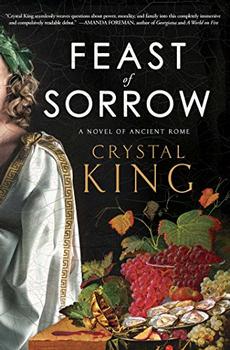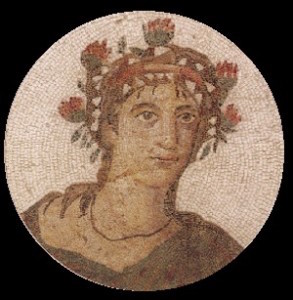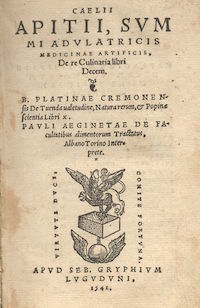Summary | Excerpt | Reading Guide | Reviews | Beyond the Book | Read-Alikes | Genres & Themes | Author Bio

Critics' Opinion:
Readers' Opinion:
First Published:
Apr 2017, 416 pages
Paperback:
Apr 2018, 416 pages
 Book Reviewed by:
Book Reviewed by:
Davida Chazan
Buy This Book
This article relates to Feast of Sorrow
 In Crystal King's Feast of Sorrow, Apicius and his slave, Thrasius, develop their own cookbook. A quick search into Roman history reveals that Marcus Gavius Apicius actually did publish such a book (or rather a series of them), which most historians consider the first cookbook ever written. However, nowhere in the 450-500 recipes in this eponymously titled tome is there a reference to a slave by name. King made this literary leap, jumping to the conclusion that it was highly likely that a slave invented and/or produced recipes for the Apicius household, and not the master himself. The fact that several sources I found note that the language used in these books was more "vulgar" than "classical" Latin would also support this idea – even literate slaves would use less sophisticated language than their patrician masters.
In Crystal King's Feast of Sorrow, Apicius and his slave, Thrasius, develop their own cookbook. A quick search into Roman history reveals that Marcus Gavius Apicius actually did publish such a book (or rather a series of them), which most historians consider the first cookbook ever written. However, nowhere in the 450-500 recipes in this eponymously titled tome is there a reference to a slave by name. King made this literary leap, jumping to the conclusion that it was highly likely that a slave invented and/or produced recipes for the Apicius household, and not the master himself. The fact that several sources I found note that the language used in these books was more "vulgar" than "classical" Latin would also support this idea – even literate slaves would use less sophisticated language than their patrician masters.
 What is amazing is that this cookbook, which is about 2000 years old, is still around today. I found numerous references to publications of this particular collection of recipes in the original Latin, starting from the year 50 in Rome, again in 500 in Greece, and continuing across the centuries, with some translations into Italian and German along the way. The Guttenberg Project has the Frederick Starr translation of this cookbook first published in Chicago in 1926. In the preface, it says "The present version has been based chiefly upon three principal Latin editions, that of Albanus Torinus, 1541, who had for his authority a codex he found on the island of Megalona, on the editions of Martinus Lister, 1705-9, who based his work upon that of Humelbergius, 1542, and the Giarratano-Vollmer edition, 1922." Starr, who was a Professor of Anthropology at the University of Chicago, claims to be the first to translate this book into English.
What is amazing is that this cookbook, which is about 2000 years old, is still around today. I found numerous references to publications of this particular collection of recipes in the original Latin, starting from the year 50 in Rome, again in 500 in Greece, and continuing across the centuries, with some translations into Italian and German along the way. The Guttenberg Project has the Frederick Starr translation of this cookbook first published in Chicago in 1926. In the preface, it says "The present version has been based chiefly upon three principal Latin editions, that of Albanus Torinus, 1541, who had for his authority a codex he found on the island of Megalona, on the editions of Martinus Lister, 1705-9, who based his work upon that of Humelbergius, 1542, and the Giarratano-Vollmer edition, 1922." Starr, who was a Professor of Anthropology at the University of Chicago, claims to be the first to translate this book into English.
 However, I also found Bill Thayer's site, with a translation by Joseph Dommers Vehling, which also claims to be the first English translation. His work is included in a book edited by Walter M. Hill (1936). That book is now in the public domain after its final reprint by Dover Publications in 1977. The Thayer site links to online copies of each of the ten chapters (or books), with an additional chapter/book written by someone called Vinidarius. Thayer seems to believe that this Vinidarius (or in Latin, Vinidario Viro Inlustri) was a student of Apicius. There's some debate about his recipes; some say their similarity means they were probably plagiarized and/or slightly edited. Others believe they deserve separate recognition (which would be fitting for someone known as "the Illustrious Man") as original recipes, but they're most certainly from the first century. King honored him by introducing the last section of this novel with a recipe found in Vinidarius' manuscript.
However, I also found Bill Thayer's site, with a translation by Joseph Dommers Vehling, which also claims to be the first English translation. His work is included in a book edited by Walter M. Hill (1936). That book is now in the public domain after its final reprint by Dover Publications in 1977. The Thayer site links to online copies of each of the ten chapters (or books), with an additional chapter/book written by someone called Vinidarius. Thayer seems to believe that this Vinidarius (or in Latin, Vinidario Viro Inlustri) was a student of Apicius. There's some debate about his recipes; some say their similarity means they were probably plagiarized and/or slightly edited. Others believe they deserve separate recognition (which would be fitting for someone known as "the Illustrious Man") as original recipes, but they're most certainly from the first century. King honored him by introducing the last section of this novel with a recipe found in Vinidarius' manuscript.
In 1958, two translators published another English version of this cookbook – Barbara Flower and Elisabeth Rosenbaum – titled Apicius: The Roman Cookery Book. Most sites I found considered this the definitive English version. Then in 2006, Sally Grainger published yet another translation, Cooking Apicius, based on her husband Dr Christopher Grocock's translation of the original Latin. This is the version that Crystal King draws from to introduce sections of Feast of Sorrows. In the introduction to Cooking Apicius, Grainger notes:
Apicius was written from the perspective of the producer of meals, not the consumer. The gourmet Apicius might well have enjoyed eating (some of) these dishes, and describing them in purple terms, but he certainly was not the author of the Apicius text.
This, together with Grainger's corroboration of what she calls the "blue-collar" style of Latin, gives credence to King's assumption that it was a slave or employee of Apicius who was the real author behind this original cookbook. And so it certainly is very appropriate that an author finally gives a fictional "voice" to what is the oldest collection of recipes on earth.
Marcus Gavius Apicius, courtesy of earlychurchhistory.org
Apicius, De re culinaria, Lyon: Sebastianus Gryphium, 1541
Vinidarius, courtesy of memim.com
Filed under Books and Authors
![]() This "beyond the book article" relates to Feast of Sorrow. It originally ran in May 2017 and has been updated for the
April 2018 paperback edition.
Go to magazine.
This "beyond the book article" relates to Feast of Sorrow. It originally ran in May 2017 and has been updated for the
April 2018 paperback edition.
Go to magazine.





The Flower Sisters
by Michelle Collins Anderson
From the new Fannie Flagg of the Ozarks, a richly-woven story of family, forgiveness, and reinvention.

The House on Biscayne Bay
by Chanel Cleeton
As death stalks a gothic mansion in Miami, the lives of two women intertwine as the past and present collide.

The Funeral Cryer by Wenyan Lu
Debut novelist Wenyan Lu brings us this witty yet profound story about one woman's midlife reawakening in contemporary rural China.
Your guide toexceptional books
BookBrowse seeks out and recommends the best in contemporary fiction and nonfiction—books that not only engage and entertain but also deepen our understanding of ourselves and the world around us.